What are Because and Because of? The difference between Because and Because of
The structures Because and Because of are basic grammar knowledge that is frequently used in communication as well as in English exams. Let's refer to the definitions, structures, usage, examples, and detailed exercises on Because and Because of below with PREP.
- I. What is Because?
- II. What is Because of?
- III. Structure and usage of Because
- IV. Structure and usage of Because of
- V. Distinguishing between Because and Because of in English
- VI. Rules for Converting the Structure of "Because" to "Because of"
- VII. Rules for Converting the Structure of "Because of" to "Because"
- VIII. Common Mistakes When Using Because of and Because
- IX. Because and Because of exercises with answers
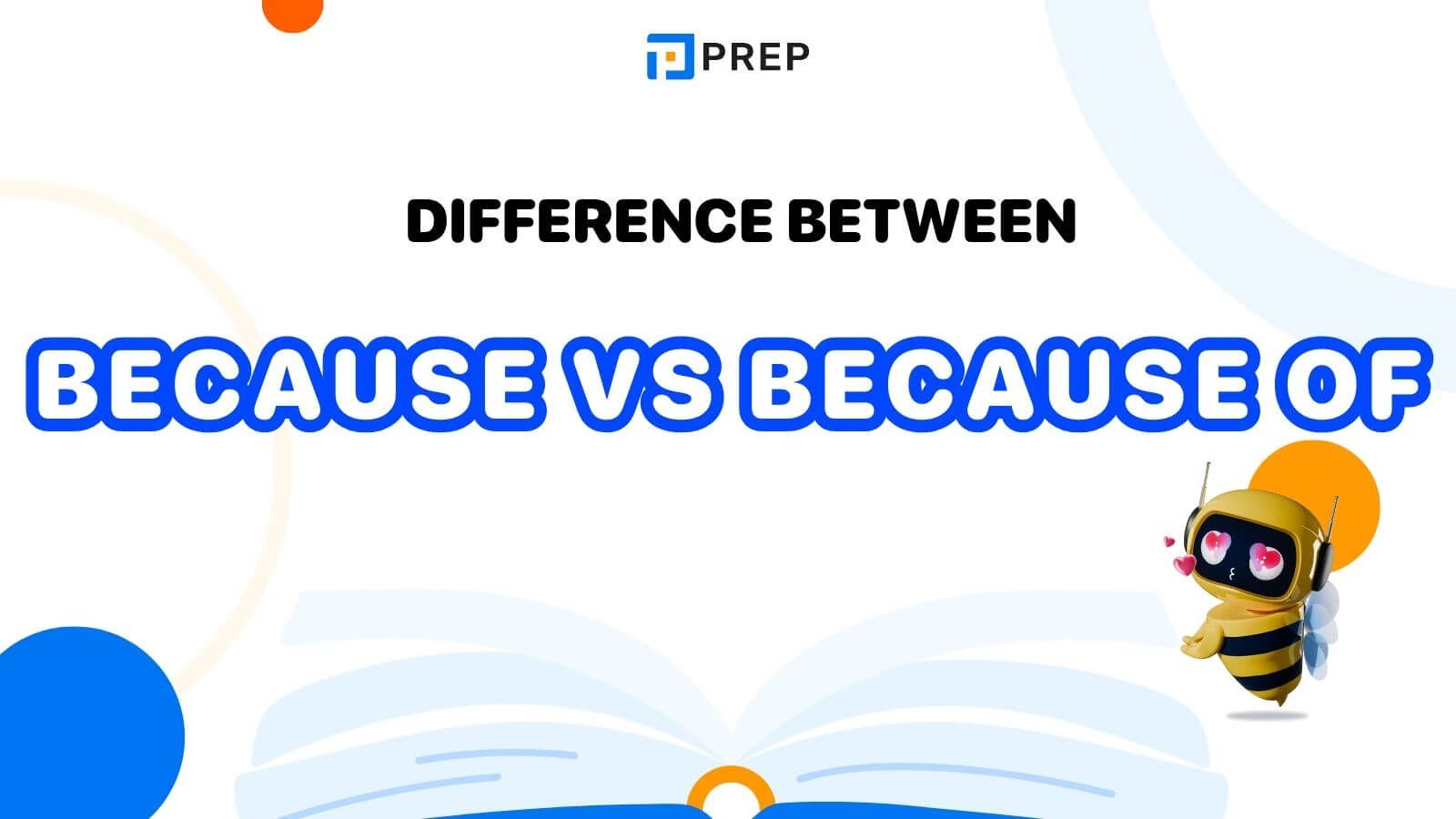
I. What is Because?
1. Definition
“Because,” pronounced /bɪˈkɒz/, is a subordinating conjunction that introduces a clause that explains an action or situation. “Because” functions as both a conjunction and a preposition in a sentence. For example:
-
As a conjunction: I couldn't go to the party because I was sick.
-
As a preposition: I like this film because reasons.

2. Because’s collocations
|
Because’s collocation |
Meaning |
Example |
|
(all) the more so because… |
Used to emphasize a reason for a situation or condition, indicating that the statement made is even more valid or significant due to a particular cause.
|
Elly is really looking forward to the trip, all the more so because she hasn't been on vacation in years. |
|
just because I'm paranoid doesn't mean they're not out to get me |
Used to convey the idea that although someone might have excessive worries or fears about being harmed or persecuted, it doesn't negate the possibility that there is a legitimate threat or intention from others to cause harm.
|
Eric said : “Just because I’m paranoid doesn’t mean they’re not out to get me; sometimes, our fears have a basis in reality.” |
3. Because’s synonyms
|
Because’s synonyms |
Pronunication |
Meaning |
Ví dụ |
|
As |
/æz/ |
Because; at the time of
|
As a result of my hard work in learning English, I have a chance to work overseas. |
|
Since |
/sɪns/ |
Because; from the time when
|
Since we've been geographically apart, our friendship has gradually weakened. |
|
For |
/fɔːr/ |
Because |
For the sake of her poor family, she had to drop out of school and work abroad. |
|
As a result of |
/æz ðə rɪˈzʌlt ɒv/ |
As a consequence of
|
As a result of their stubbornness, Anna and John broke up before their wedding. |
|
Because of |
/bɪˈkɒz ɒv/ |
Due to
|
Because of my excellent work performance, I received a big bonus this month. |
|
Due to |
/djuː tuː/ |
Because of; thanks to
|
Due to her parents' upbringing, Ella became a good person. |
|
Owing to |
/ˈəʊɪŋ tuː/ |
Because of; thanks to
|
Owing to her day and night efforts, Emily won a full scholarship to study in the US. |
|
On account of |
/ɒn əˈkaʊnt tuː/ |
Because of; due to
|
On account of driving under the influence of alcohol, Mick had a serious accident |
|
Thanks to |
/θæŋks tuː/ |
Due to; because of
|
Thanks to her parents' help, Bella was able to buy a house at the age of 22. |
|
For the sake of |
/fɔː ðə seɪk ɒv/ |
In the interest of; for the benefit of
|
For the sake of learning effectively, I was able to memorize 100 new words every day. |
|
In light of |
/ɪn laɪt əv/ |
Considering; because of
|
In the light of family background, Misa is not as well-off as Anna. |
|
In view of |
/ɪn vjuː əv/ |
Taking into account; because of
|
In view of her qualifications, Mille is a very suitable candidate for this position. |
II. What is Because of?
1. Definition
"Because of," pronounced /bɪˈkɑːz ˌəv/, means "due to something," for example, "due to the rain," "due to traffic jam," "due to a stomachache," etc. "Because of" is a prepositional phrase that typically appears before a noun, a gerund (V-ing), or a pronoun to indicate the cause of a situation or action.
-
I decided to stay at home because of my pet.
-
My co-worker was late because of the heavy traffic jam in Upper Serangoon street.
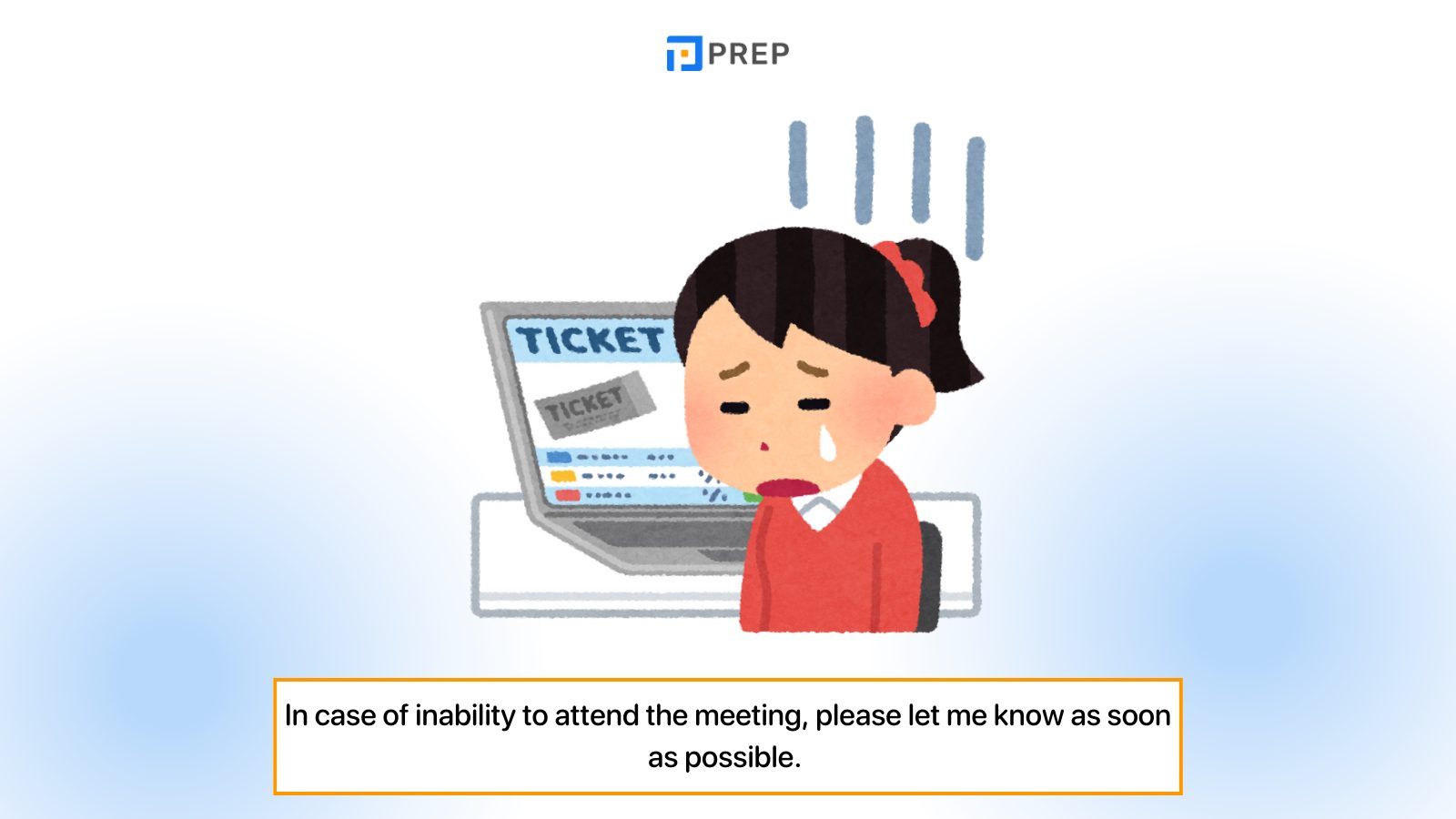
2. Some words/phrases that can replace "because of":
| Words/phrases | Pronunciation |
Meaning |
Example |
|
In case of |
/in keɪs/ |
Used to indicate what will happen or should be done if a specific situation arises; in the event of |
In case of inability to attend the meeting, please let me know as soon as possible. |
|
By dint of |
/baɪ dɪnt əv / |
Used to express that something has been achieved through effort, means, or method; mainly used in more formal or literary contexts |
By dint of my colleagues help, the Prep Talk project was a success. |
|
Due to |
/djuː tə/ |
Used to indicate the reason or cause for something. |
Due to her parents' pressure, Clara developed depression. |
|
Inasmuch as |
/ɪnəzˈmʌtʃ æz/ |
Used to introduce a reason that partially explains or qualifies a statement; essentially means 'to the extent that.' |
Inasmuch as Lavender won the national first prize, she was admitted to university without an entrance exam. |
|
By/in virtue of |
/baɪ/in ˈvɜːtʃuː ɒv/ |
Used to express the reason for something happening or the means by which something is done; often implies a positive circumstance or quality. |
She got her new job by virtue of her great expereince. |
III. Structure and usage of Because
Usage: "Because" functions as a subordinating conjunction, commonly used to connect two independent clauses that have a cause-and-effect relationship.
Notes:
-
After "because," there is always a complete English clause with a subject and verb.
-
"Because" acts as a preposition that precedes a clause indicating the cause.
-
We use a comma when the dependent clause comes before the main clause.
Structure:
Because + S + V + O (dependent clause), S + V + O (main clause)
S + V + O (main clause) because S + V + O (dependent clause)
For example:
-
Because I looked at my phone in the dark for a long time, my nearsightedness has increased.
-
Because she gained weight, she couldn't fit into the dress she bought last month.
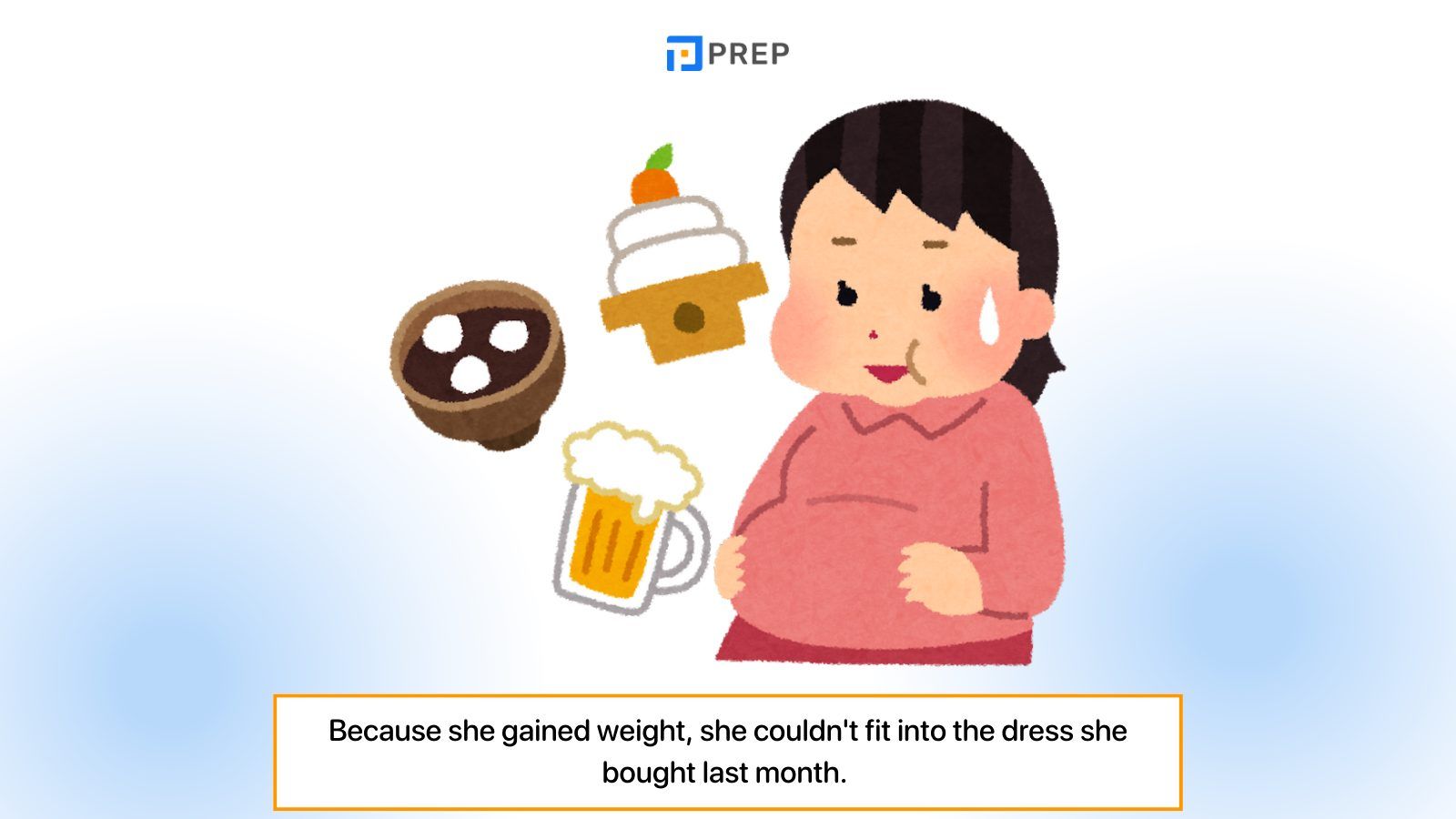
IV. Structure and usage of Because of
Usage: "Because of" precedes a dependent clause. The clause containing "because of" can appear either before or after the main clause.
Structure:
Because of + object/noun/noun phrase/gerund, main clause (with a comma)
Main clause + because of + noun/gerund/noun phrase (without a comma)
For example:
-
Yesterday, because of the rain, Linda and her best friend didn’t go to the picnic.
-
Jessica doesn’t want to drink milk tea because of being nausea.
Notes:
-
Following the phrase "because of," you may encounter words such as: object, noun, pronoun, or gerund phrase.
-
"Because of" is a prepositional phrase in English.
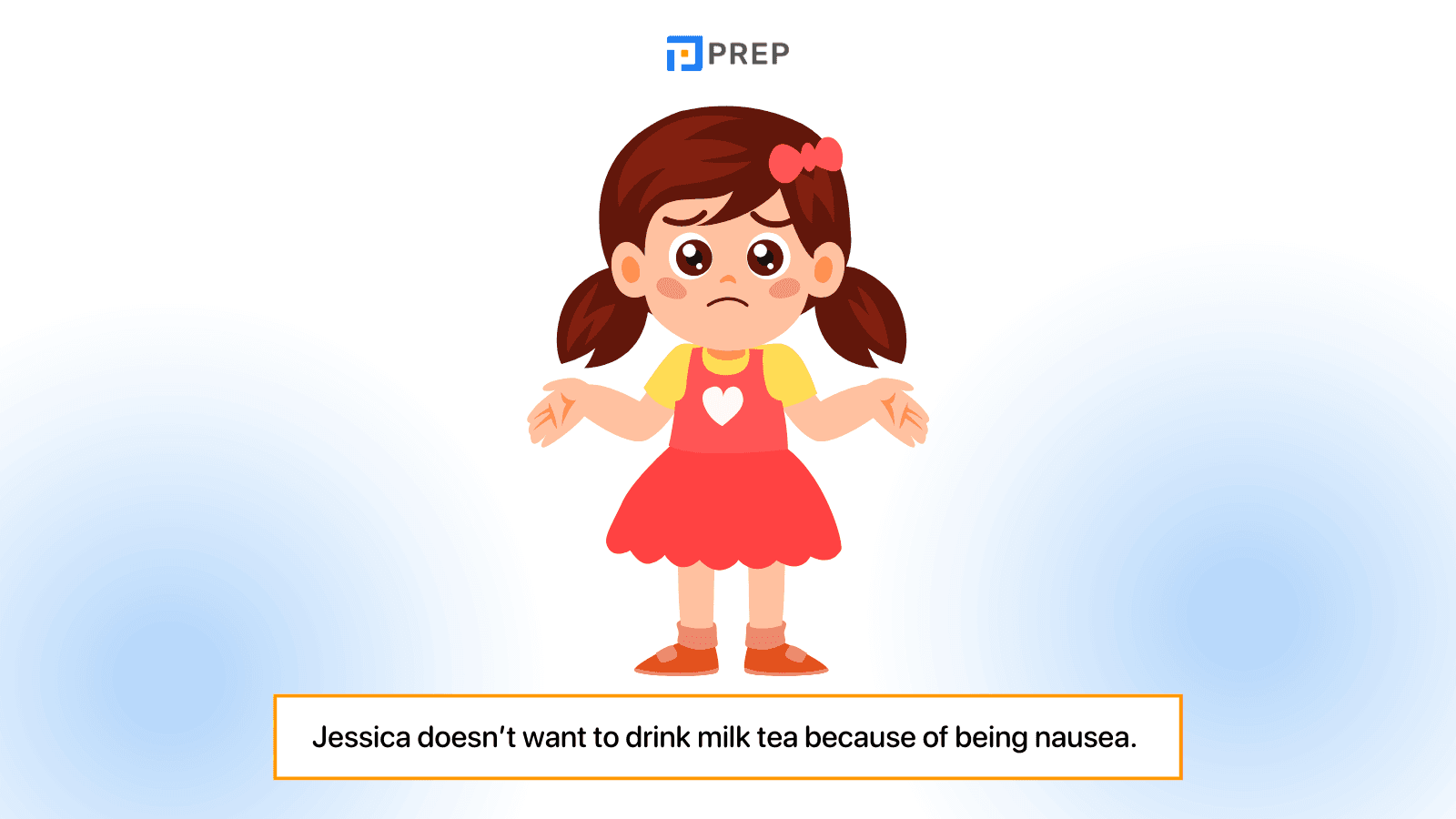
V. Distinguishing between Because and Because of in English
Below are the similarities and differences between Because of vs Because along with Because and Because of examples:
|
Distinguishing between Because vs Because of in English |
Because |
Because of |
|
Similarities |
|
|
|
Differences |
"Because" appears before the clause that describes the cause and connects that clause with the other clause in the complex sentence. |
"Because of" – this phrase will appear before a noun/noun phrase or gerund (or a phrase beginning with a gerund) indicating the cause and connects it with the other clause in the complex sentence. |
|
Examples |
Because Jack was heartless, he lost the person he loved. |
Because of her carelessness, Emily failed the university entrance exam with silly mistakes. |
VI. Rules for Converting the Structure of "Because" to "Because of"
|
Cases |
How to Convert |
Examples |
|
When the Subjects of Both Clauses are the Same
|
If the subjects of both clauses in the English sentence are the same, omit the subject of the "because" clause, and add the ending -ing to the verb that follows.
|
Because John is tall, he can reach this novel on the shelf. ➡ Because of being tall, John can reach this novel on the shelf.
|
|
When There is a Noun/Noun Phrase in the "Because of..." Clause
|
After applying the first rule, if only a noun or noun phrase remains in the "because of..." clause, keep that noun or noun phrase and omit the -ing.
|
Elsa postponed her trip because she had an urgent job interview. ➡ Rule 1: Because of having an urgent job interview, Elsa had to postpone her trip. ➡ Rule 2: Because of her urgent job interview, Elsa had to postpone her trip. |
|
When the "Because" Clause Contains a Main Verb and an Adverb of Manner
|
If the "because" clause contains a verb and an adverb of manner, we simply change the adverb to an adjective and the verb to a noun to create a noun phrase placed after "because of."
|
Because it rains suddenly, Misa's family picnic was postponed. ➡ Because of the sudden rain, Misa's family picnic was postponed. |
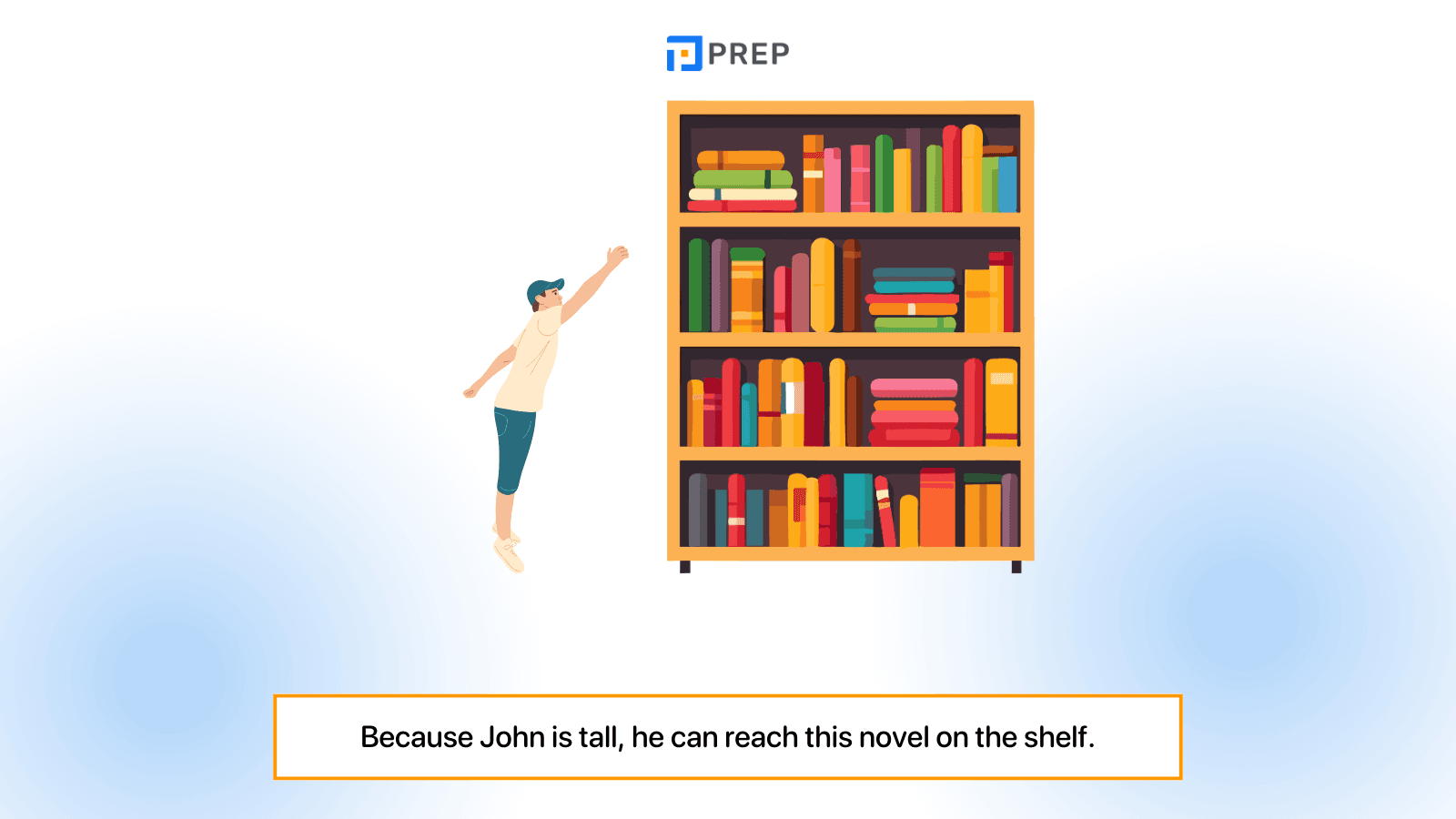
VII. Rules for Converting the Structure of "Because of" to "Because"
To convert from "because of" to "because," you need to use a complete clause structure. Below are specific common conversion cases:
|
Cases |
How to Convert |
Examples |
|
"Because of" Clause with a Gerund (V-ing) |
Use the pronoun that corresponds with the subject of the clause and conjugate the verb in the gerund according to the subject and the tense of the sentence. Formula: Because of: S1 + V1 because of + V2-ing ➡ Because: S1 + V1 because +Pronoun + V2 |
Clara couldn’t drive because of losing her key. ➡ Clara couldn’t drive because she lost her key. |
|
"Because of" Clause with a Noun |
Use the dummy subject "there + be." You need to accurately determine the tense of the main clause to conjugate the verb "be" accordingly. Structure: Because of": S1 + V1 because of + N → "because": S1 + V1 because + there + be + N |
Because of the traffic jam, we were late for the meeting.
→ We were late for the meeting because there was a traffic jam. |
|
"Because of" Clause with a Noun Phrase |
Accurately determine the type of noun phrase being used in the "because of" clause and convert it according to the corresponding structure:
|
|
VIII. Common Mistakes When Using Because of and Because
Refer to the table below to understand common mistakes when using the structures Because and Because of:
|
Common Mistakes with Because and Because of |
Example |
|
Using both “because” and “so” in the same sentence: If both "because" and "so" appear in the same sentence, this is a basic grammatical error. To avoid this situation, always remember to use only one of the two words when expressing cause and effect! |
Correct:
Wrong:
|
|
Forgetting the necessary comma in required structures: Forgetting to use a comma can cause you to lose points in English writing exams. Therefore, review the "because" structures that must use a comma, which are:
|
Correct:
Wrong:
|
|
Misplacing Because and Because of: "Because" should precede a clause while "because of" should precede (a) noun or a gerund. However, these two structures are quite similar, leading many to confuse them. Specifically, they use "because" before a noun/noun phrase/gerund and use "because of" before a clause. |
Correct:
Wrong:
|
IX. Because and Because of exercises with answers
Let's complete some exercises below with PREP to understand the correct usage of the two terms/phrases Because and Because of in English:
Exercise 1: Rewrite the sentences using Because and Because of:
-
Because it is raining, they stopped the football match. ➡
-
Because Ted had a stomachache, he is absent today. ➡
-
Because he is kind, everyone loves him. ➡
-
Because I had a long trip, I was too tired. ➡
-
Because she passed the test, her parent was very proud of her. ➡
Exercise 2: Fill in the blanks with Because or Because of:
-
We stopped swimming ……. the rain.
-
It was all …….. her that they got into trouble.
-
We had to hurry indoors …… it was lightning.
-
Hoa is late ……. the traffic.
-
They didn’t arrive until 6 o’clock …….. the traffic on Kings street was terrible.
Answer keys:
|
Exercise 1
|
|
Exercise 2: Because of - Because of - Because - Because of - Because |
Here is an overview of the structure and usage of Because and Because of in English. Please keep this information for review to help you distinguish and accurately determine when to use Because and Because of, Preppies!
PREP – the smart learning and test preparation platform integrated with AI, helps you learn English grammar and vocabulary through modern methods such as Context-based Learning, Task-based Learning, and Guided Discovery, transforming dry knowledge into engaging and easily understandable lessons.
Additionally, PREP provides mind maps that summarize key concepts, making it easier for students to review and look up information.
With the support of the exclusive Prep AI, you will have your pronunciation errors detected and corrected, with assistance throughout the process of improving pronunciation from individual sounds to complete sentences.
Prep AI technology also helps you practice dictation, strengthen your vocabulary, and become familiar with native speakers' intonation.
Download the PREP app now to study English online at home with a high-quality online learning program.

Hi I'm Chloe, and I am currently serving as an Product Content Administrator at Prep Education. With over five years of experience in independent online IELTS study and exam preparation, I am confident in my ability to support learners in achieving their highest possible scores.
Comment
Premium content
View allPersonalized roadmap
Most read












